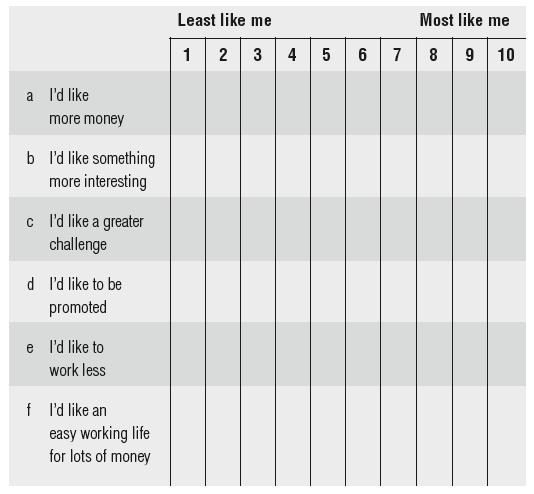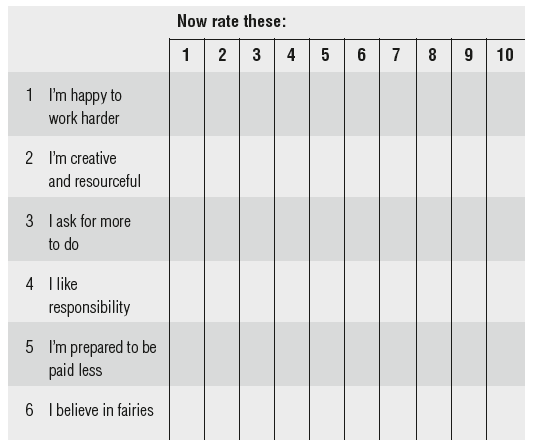RIGHT JOB?
The question you need to ask yourself about your current job is simply: ‘Is this really what I want to do?’ If the answer is ‘no’, then stage one is not to beat yourself up over it as the chances are that when you took the job there was a very good reason for it. It’s just that things change.
So, decision time: do you want to improve what you have right now or find a new job? I’ll help you deal with both options.
Let’s start with improving what you have right now. When you started in your chosen job there must have been some compelling reasons why you chose it as a career. Let’s see what type of person you are.
Give yourself a score out of 10 for the following:


If you gave yourself high marks for a, b, c and d then you’ll have to be prepared to have high marks for 1, 2, 3 and 4. If you gave a high mark for e, then the chances are high you’ll have to accept 5 and if you have a high mark for f then you MUST have a high mark for 6.
Breathe life into your current job
It is common for jobs to change greatly in a short time. Responsibilities change, bosses change, targets change. The job you’re doing today may not be the one you applied for and you didn’t see it coming. So, what can you do about it? You can start by looking at what you want from the lists and asking if you are prepared to do what is necessary to achieve them.
Look back at the core reason why you took this career path. I often work with teachers, some of whom complain about how terrible their working lives are. During my keynote presentations, I’ll challenge the audience with: ‘If you don’t love it – don’t do it.’ For teachers, I add: ‘Remember what you do for a living. You are directly involved with improving the quality of life for often some of the most vulnerable people in our society. You have the best job in the world!’
Teachers can get caught up in politics, legislation, funding, working conditions and a million other issues. I like to remind them of what attracted them to teaching in the first place.
Remind yourself of the core reasons why you wanted your current job.
Next, rewrite your job description. This preparation is a vital part of the process. Write the type of job you want to do within your organisation. Next, if you are a valuable member of the organisation, ask for a review with your boss. If you feel you aren’t a valuable member of your team then meet your boss and have a discussion about that first.
This next stage only works if you are a cherished component of the organisation. Tell them how you are feeling and present them with your new job description. Ask how close you can get to that description in the next 90 days. If you are a valued member of the team I’ll guarantee you’ll get most of what you ask for.
Now, with your re-energised belief in what you are doing, throw yourself into your brilliant job. And if it doesn’t work out you can always . . .
Find a new job
It may be that you have just reached the end of your time with your current job and it’s time to move on. Read Chapter 50; you’ll get the motivation and the plan to go out there and find the job you really want.
How to leave your job brilliantly
Martin Beeson worked for me as a marketing manager; he’s very bright and came from a corporate giant to our considerably smaller business. Six months into his appointment, he asked for a meeting and told me that he wanted to get back into the world of large-scale marketing. Although working with a small team was fun, he didn’t see a long-term future with me. He wanted me to know that he would be looking for jobs and would I be a referee.
Two weeks later he showed me three jobs he was interested in and asked for my opinion. A few days later he asked me to look over his application and give him some thoughts and advice.
A week later he asked to book a day’s holiday to go for an interview. He got the job. Martin then worked three weeks’ notice and moved to London to work for BMI. What a perfect way to leave.
Here’s how not to do it!
Have a look of guilt when your boss sees you reading the jobs section in your paper. Use company time to apply for a job. Lie to your boss saying you have a doctor’s appointment when you really have an interview. Tell your workmates before you tell your boss that you’ve been offered a new position.
I have a brilliant relationship with Martin; we have stayed friends and I was happy to be a referee when he applied for his visa to move to Australia. He stays in touch, I’d give him a reference any day and I’m proud to say I know him.
Then there are other people who have worked for me who . . . well, let’s not go there.
Be proactive
What do you really love to do? What gives you energy rather than taking it away? Write a list of everything you love to do then see if you can build a career around that.
Don’t wait for your dream job to be advertised in the newspaper. Register with agencies, find the type of organisation you want to work for and try to meet with senior people from that organisation. Ask them what they are looking for in new staff and ask them when they will next be recruiting.
Final thought
How do you know you’re in the right job or career? Easy, the same way you know when you’re not. You feel it!
BRILL BIT
Every time you complain about your work, your bosses or how bad things are, you are demonstrating and reaffirming your lack of courage to do something about it. If you think you are being unfulfilled, lack challenge, respect and value, it’s worth taking a look in the mirror and exploring the likely source.
